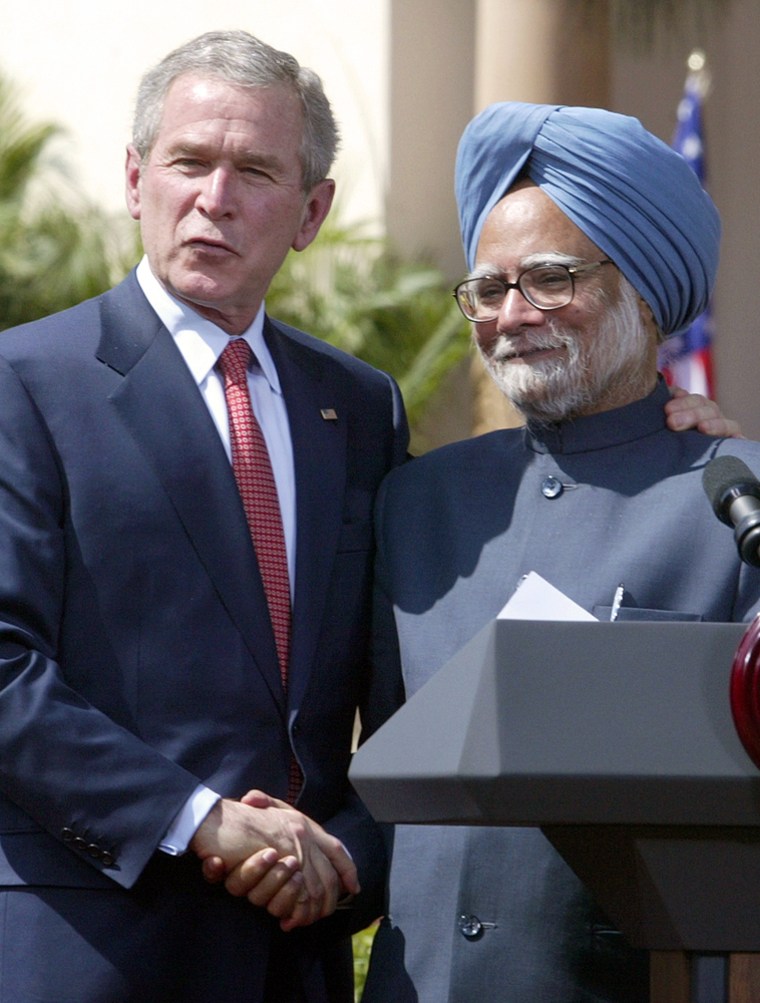U.S. lawmakers are cautioning that an agreement to share U.S. civilian nuclear technology with India still faces obstacles in Congress, where some worry it could undermine efforts to stop nuclear proliferation.
President Bush and Indian Prime Minister Manmohan Singh agreed to the plan’s details Thursday. Lawmakers from both political parties said they would wait for the Bush administration to argue its case before deciding whether they would allow civilian nuclear shipments to India.
“Does this deal make us more secure or less secure?” asked Sen. Joe Biden, senior Democrat on the Senate Foreign Relations Committee. “The administration must show Congress it will make us more secure by bringing India into closer compliance with international nonproliferation norms.”
Lawmakers pivotal to issue
What lawmakers think is crucial, because they must either approve an exception to, or change, the U.S. law that bans civilian nuclear cooperation with countries that have not submitted to full nuclear inspections.
India has refused to sign the international Nuclear Non-Proliferation Treaty, and some fear the Bush plan could allow rogue countries outside the NPT to build nuclear weapons programs with imported civilian nuclear technology.
Bush gave a nod Thursday to the hard work ahead, saying he looked forward to working with lawmakers to “change decades of law that will enable us to move forward in this important initiative.”
“It’s not easy for the American president to achieve this agreement. But it’s a necessary agreement,” Bush told reporters in India.
Breaking from the pack
Though both chambers of Congress are controlled by Bush’s Republican Party, lawmakers have shown a growing tendency to break from Bush’s leadership as his popularity declines and congressional elections approach in November. Most recently, they have revolted over a decision by the administration to allow a Dubai-based company to operate parts of six major U.S. ports.
Bush and Singh signed the civilian nuclear agreement in July, but it hinged partly on India’s separation of its military and civilian nuclear programs.
Details of Thursday’s agreement remained murky, but a U.S. official said India agreed to classify 14 of its reactors as civilian, which would open them to international inspection; eight were deemed military reactors, which exempts them from inspection.
One issue likely to worry lawmakers is the unclear status of several other Indian reactors and whether they would be open to inspection.
Rep. Jim Leach, Republican chairman of the House of Representatives International Affairs subcommittee on Asia, said Congress faces a key question: whether the proposed agreement strengthens the NPT “or whether it symbolizes an irreparable breach.”
Whither Pakistan?
Critics of the plan worry how the world’s other nuclear powers will view a unilateral decision by the United States to loosen restrictions on the distribution of nuclear supplies.
India’s nuclear rival neighbor, Pakistan, where scientist A.Q. Khan ran a network that smuggled nuclear technology to Libya, Iran and North Korea, told Bush in January that it also wants U.S. civilian nuclear technology.
Democratic Rep. Ed Markey, an outspoken critic of the plan, called it a “historic nuclear failure” that endangers U.S. national security.
“With one simple move, the president has blown a hole in the nuclear rules that the entire world has been playing by,” Markey said.
Congressman to Bush: Make the case ‘or else’
Rep. Gary Ackerman, another Democrat, said that while he supported the nuclear plan, Bush “has, thus far, done a horrendous job of convincing Congress that the agreement is a good idea.”
He urged Bush to “get to work and make the case to Congress or else the nuclear deal will blow up in his face.”
At the United Nations in New York, Mohamed ElBaradei, director-general of the International Atomic Energy Agency, welcomed the agreement as “an important step toward satisfying India’s growing need for energy ... as an engine for development.”
“It would also bring India closer as an important partner in the nonproliferation game,” ElBaradei said in a statement. “It would be a milestone, timely for ongoing efforts to consolidate the nonproliferation regime, combat nuclear terrorism and strengthen nuclear safety.”
